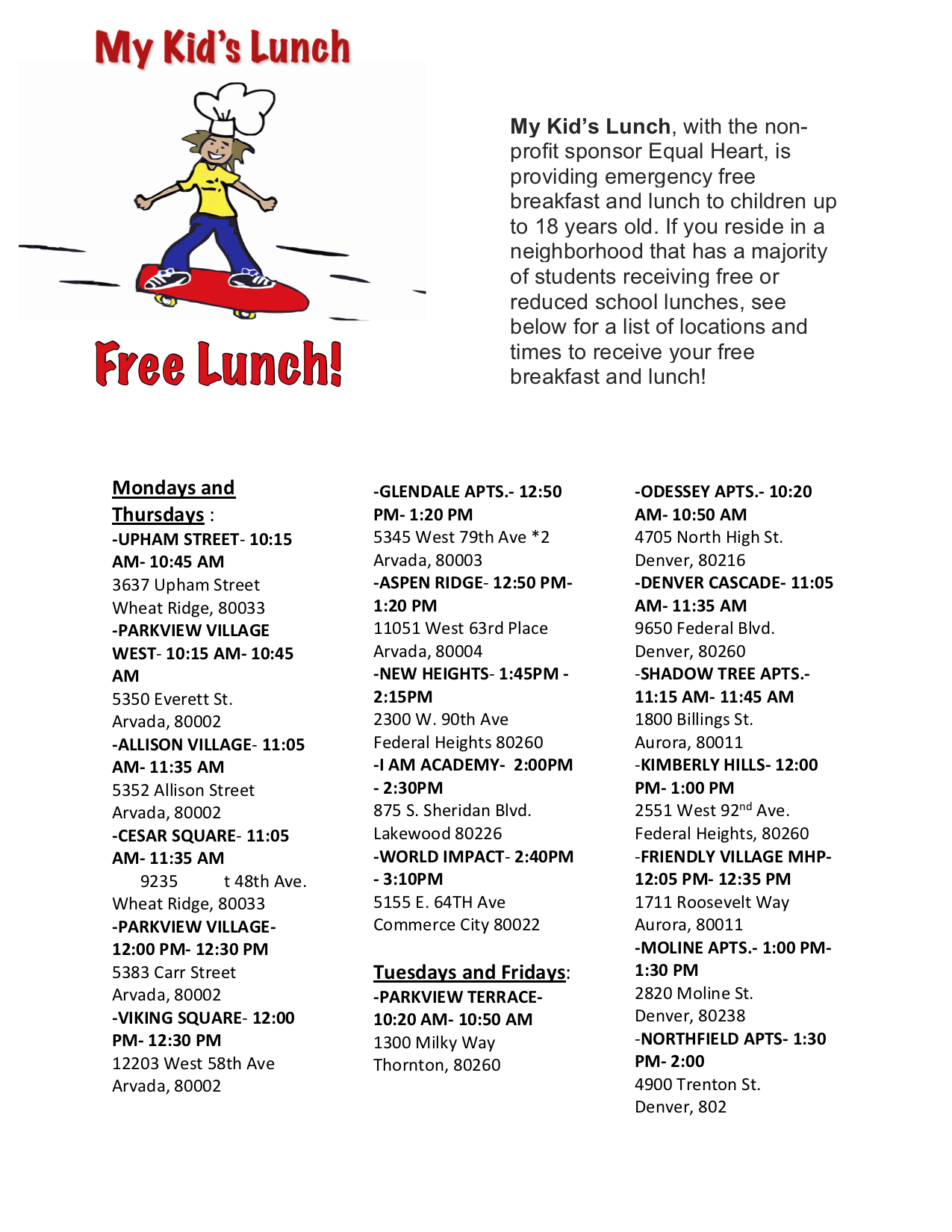My Kid's Lunch, with the non-profit sponsor Equal Heart is providing emergency free breakfast and lunch to children up to 18 years old. If you reside in a neighborhood that has a majority of students receiving free or reduced school lunches, see below for a list of locations and times to receive your free breakfast and lunch!
Mondays and Thursdays we will be at the following locations:
- UPHAM STREET- 10:15 AM- 10:45 AM
3637 Upham Street
Wheat Ridge, 80033
- PARKVIEW VILLAGE WEST- 10:15 AM- 10:45 AM
5350 Everett St.
Arvada, 80002
- ALLISON VILLAGE- 11:05 AM- 11:35 AM
5352 Allison Street
Arvada, 80002
- CESAR SQUARE- 11:05 AM- 11:35 AM
9235 West 48th Ave.
Wheat Ridge, 80033
- PARKVIEW VILLAGE- 12:00 PM- 12:30 PM
5383 Carr Street
Arvada, 80002
- VIKING SQUARE- 12:00 PM- 12:30 PM
12203 West 58th Ave
Arvada, 80002
- GLENDALE APTS.- 12:50 PM- 1:20 PM
5345 West 79th Ave *2
Arvada, 80003
- ASPEN RIDGE- 12:50 PM- 1:20 PM
11051 West 63rd Place
Arvada, 80004
- NEW HEIGHTS- 1:45PM - 2:15PM
2300 W. 90th Ave
Federal Heights 80260
- I AM- 2:00PM - 2:30PM
875 S. Sheridan Blvd.
Lakewood 80226
- WORLD IMPACT- 2:40PM - 3:10PM
5155 E. 64TH Ave
Commerce City 80022
Tuesdays and Fridays we will be at the following locations:
- PARKVIEW TERRACE- 10:20 AM- 10:50 AM
1300 Milky Way
Thornton, 80260
- ODESSEY APTS.- 10:20 AM- 10:50 AM
4705 North High St.
Denver, 80216
- DENVER CASCADE- 11:05 AM- 11:35 AM
9650 Federal Blvd.
Denver, 80260
- SHADOW TREE APTS.- 11:15 AM- 11:45 AM
1800 Billings St.
Aurora, 80011
- KIMBERLY HILLS- 12:00 PM- 1:00 PM
2551 West 92nd Ave.
Federal Heights, 80260
- FRIENDLY VILLAGE MHP- 12:05 PM- 12:35 PM
1711 Roosevelt Way
Aurora, 80011
- MOLINE APTS.- 1:00 PM-1:30 PM
2820 Moline St.
Denver, 80238
- NORTHFIELD APTS- 1:30 PM- 2:00
4900 Trenton St.
Denver, 80238




